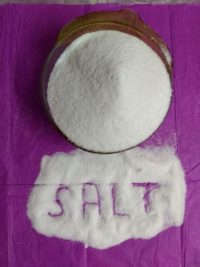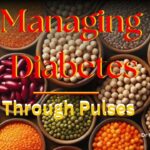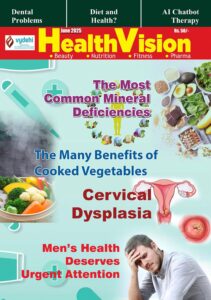Salt wonder – Is salt harmful to our body?
Doctors these days recommend less salt diet. Is salt harmful to our body? In fact, it is very essential for proper functioning of body, just like air and water. Too much or too less of salt can create havocs in the body.
Food and nutrition plays an important role in our life. Salt plays a major role in the functioning of the human body as it is the major component of blood plasma fluid, extra cellular fluid and amniotic fluid (nourishing and protecting liquid around a baby in mother’s womb). Salt is important for maintaining biological processes like carrying nutrients into and out of cells, regulates nerve impulses, and helps brain for sending signals to muscles. Salts are different in their origin, chemistry, crystal structure, biological effects or even flavour.
The crystalline structure of salt stores vibrational energy which is restorative to the body. A low salt and high water diet can disturb the balance of fluids in the blood, with symptoms like nausea, vomiting, headache, confusion, lethargy, fatigue, loss of appetite, restlessness, muscle weakness, spasms and seizures. It may also lead to “Hyponatremia”, an electrolyte disturbance in which sodium concentration (salt) in the blood (serum) is lower than normal. It may occur for people who consume too much fluids during endurance events, people who fast on juice or water for extended period and people whose dietary sodium intake is insufficient, especially in combination with drinking diuretic (substances which make you pass more urine) beverages. Whereas, the high salt diet leads to diseases like High BP, stroke and weight gain.


We need adequate salt intake for optimal growth of fat, bone and muscle tissues. A study conducted shows that, salt restriction may negatively affect glucose metabolism and disturb normal blood viscosity. Salt deficiency can also induce behavioural changes such as reduced motivation, fatigue and feeling of low moods which are in fact, the first signs of a nutritional deficiency in diet. Person who work in exceptionally warm surroundings, slack large quantities of salt in the form of sweating and they frequently complain of having lethargy, headache, lack of concentration and sleep instabilities along with emotional sadness. Mood changes and loss of appetite are the first noticeable signs of sodium deficiency.
Natural unrefined salt with its healing powers is quite different from the refined salt we get in markets today. The ordinary salt undergoes a great deal of processing in the factory before it reaches the common man. What we get is approximately 97.5 % Sodium Chloride and 2.5 % chemicals such as iodine and moisture absorbents, dried at over 12000 F. This extraordinary heat reworks the regular chemical arrangement of the salt. Unrefined salt is 84% Sodium Chloride and 16% other naturally occurring minerals, including traces of minerals like Silicon, Phosphorus and Vanadium.
For normal functioning of the body we need a pollutant free balanced salt. Table salt which we are using is chemically processed and are in unnatural form. Hence body treats or recognizes this salt as a foreign body and finds it difficult to dispose excess salt.
Processed salt has independent crystals which require tremendous energy for metabolism. More salt means impairment of ideal fluid balance and over burdening of elimination system. When body tries to isolate the excess salt; water molecules must surround the sodium chloride to break them into sodium and chloride ions before body can neutralize them. To accomplish this task water is taken from each cell. This results in less than ideal fluid balance within cells. One gram of excess sodium chloride needs 23 grams of cellular water to neutralize. Therefore eating excessive common processed table salt will collect fluids in tissues and could lead to diseases like Unsightly cellulite, Gout, Arthritis, Rheumatism and Kidney and Gall Bladder Stones.
Processed salt sometimes contain potentially dangerous preservatives like Calcium Carbonate, Magnesium Carbonate and Aluminium Hydroxide to improve salt pour ability. Aluminium is a light alloy that deposits in the brain and is a potential cause of Alzheimer’s disease.
How much salt does our body need? Our survival and normal physical development are dependent on adequate salt intake and retention. A strict vegetarian diet contains about 0.75 grams of salt per day. Ideal sodium level is 139, an optimal range of 136 to 142. However healthy body should be able to tolerate much higher levels of unprocessed salts.


Dr. Shubhankari.P. Rao
Shubha Ayurvedic centre,
3o/3 Patalamma temple street, South end Circle,
Basavangudi; Bangalore-04 Ph. 08026578620
Email: drshubhankariprao@gmail.com











